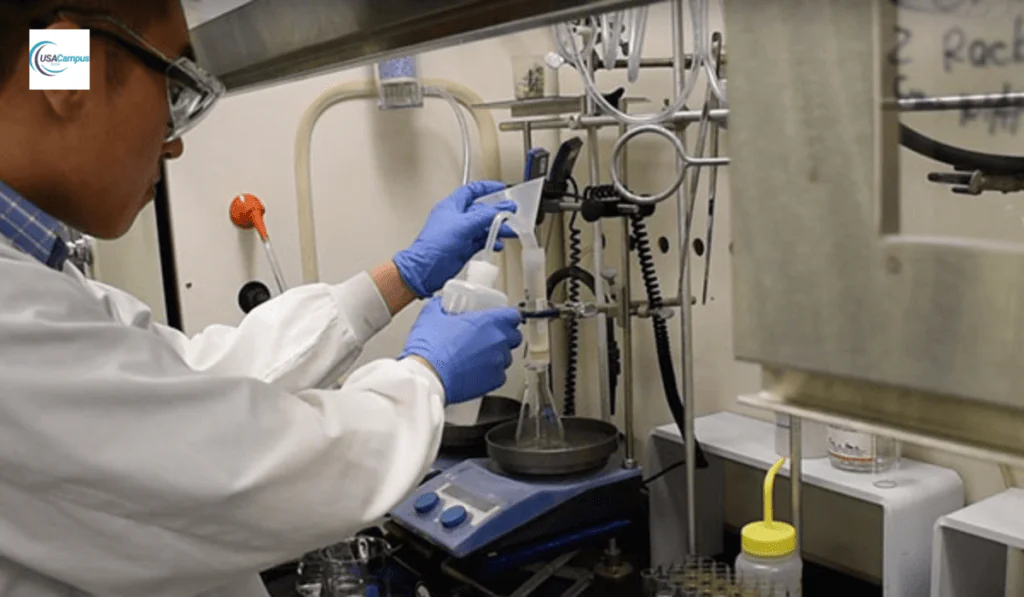Are you interested in how science and health care can work together? What are your goals if you’re interested in working in healthcare or biomedical studies? You don’t need to look further; we’ll show you best university in Canada with their best biological science programs. Scroll through this article as we investigate which institution dominates the field of cutting-edge research and innovation. Get ready to find your way to success in this cutting-edge and exciting field!
What does Biomedical Science do?
Biomedical science is a broad field that applies natural and formal science principles to develop knowledge, interventions, and technologies for use in healthcare and public health. It encompasses various disciplines that focus on the biology of human health and disease. The critical aspects of biomedical science are the disciplines Involved.
- Medical microbiology, clinical virology, clinical epidemiology, genetic epidemiology, biomedical engineering
- Anatomy, physiology, cell biology, biochemistry, microbiology, genetics, molecular biology, pharmacology, immunology, mathematics, statistics, bioinformatics

Specializations
- Biomedical science has numerous specializations, typically grouped into three main divisions: Life Sciences Specialties, Molecular pathology, blood transfusion science, Clinical biochemistry, Clinical Immunology, Hematology, histopathology, microbiology, virology, and many others.
- Physiological Science Specialties Audiology, cardiac physiology, neurophysiology, respiratory physiology, pharmacology, toxicology, etc.
- Physics and Bioengineering Specialties Biomechanical engineering, biomedical engineering, clinical engineering, diagnostic radiology, nuclear medicine, radiotherapy physics, ultrasound, and more.
Roles and Career Paths
- Biomedical scientists work in healthcare laboratories, diagnosing diseases, evaluating treatment effectiveness, and conducting research. Typical roles include
- Biomedical scientist
- Clinical research associate
- Clinical scientist (in various specialities like biochemistry, haematology, and immunology)
- Biotechnologist
- Forensic scientist
- Microbiologist
- Research scientist (life sciences, medical)
- Scientific laboratory technician
- Toxicologist
- Biomedical Engineer
- Biomedical Engineering Technologist
Other potential careers include genetic counsellor, medical sales representative, science writer, secondary school teacher, and more.
What are the requirements for getting into Nursing School in Canada? | Insider Admission Guide 2024
Admission Guide for Nursing in Canada
Education and Training
- Undergraduate degrees (B.Sc., B.Tech.) in biomedical science, life sciences, or related fields
- Postgraduate degrees (MSc, PhD) for advanced research and specialization
- Professional certifications and registrations (e.g., HCPC registration in the UK)
Biomedical science is crucial in modern medicine, contributing to disease diagnosis, treatment development, and public health initiatives through its multidisciplinary approach and specialized expertise.
Best University in Canada for Biomedical Science
Biomedical science uses biology, medicine, and engineering to study and treat human ailments. With the increased need for doctors and researchers, biomedical science degrees are becoming more popular. Canada has world-class universities with strong programs in this discipline.
Here are Canada’s top biomedical science universities with some of their best of courses.
1. University of Toronto
The Faculty of Medicine is a global leader in biomedical research and education. It has undergraduate, graduate, and professional biochemistry, molecular genetics, pharmacology, and immunology programs. The university features cutting-edge facilities and notable research partnerships. UOT stood no. 1 university in the overall ranking as it has Best lab for Biomedical subjects.
- Program Overview: Theoretical and practical expertise in cellular and molecular sciences, research opportunities in medically relevant concerns such as cancer and gene expression.
- Program Duration: 4 years.
- Tuition Fees: CA$28,247 per year for domestic students, CA$128,650 per year for international students.
- Admission Requirements: PTE Academic 60+, TOEFL 83+, IELTS 6.5+, International Baccalaureate 28+
2. McGill University
One of Canada’s oldest medical schools is in Montreal, Quebec. It has a competitive undergraduate medical laboratory sciences program in microbiology, hematology, immunology, and molecular biology. The university emphasizes research and offers students cutting-edge initiatives.

3. University of British Columbia
UBC’s Faculty of Medicine offers biomedical science Bachelor’s and Master’s degrees. Students can specialize in cancer biology, neuroscience, or cardiovascular physiology. UBC connects with top hospitals and healthcare facilities for hands-on learning. It is Best university in Canada for Biomedical science subjects.
PhD in Pathology and Laboratory Medicine
- Program Overview: Study of the pathogenesis and treatment of diseases.
- Research Areas: Experimental Medicine, Bioscience
4. McMaster University
QS World University Rankings by Subject 2021 places McMaster’s Department of Biochemistry & Biomedical Sciences in the top 50 worldwide. Its Honors Bachelor degree program provides complete understanding through coursework and lab work.
5. Western University’s
Schulich School of Medicine & Dentistry in London, Ontario, is one of Canada’s most creative health sciences schools. Medical Sciences undergraduates can specialize in anatomy and cell biology, biochemistry, neuroscience, or pathology at the Faculty of Health Sciences.
6. University of Waterloo – Biomedical Sciences (BSc)
- Program Overview: Foundational courses in biology, chemistry, physics, and math. Focus on human and animal biology with additional chemistry and physics.
- Career Paths: Medicine, dentistry, nursing, medical research, pharmaceuticals, biotechnology.
- Admission Requirements: Six Grade 12 U and/or M courses including English, Advanced Functions, Calculus and Vectors, and two of Biology, Chemistry, Earth and Space Science, Mathematics of Data Management, Physics. Admission averages: Low 80s.
- Research Opportunities: Volunteer positions in labs, full-time research in the spring term, EDGE certificate program for professional development.
7. University of Windsor – Graduate Programs in Biomedical Sciences
- MSc Biological Sciences: Two-year research project with a faculty supervisor, graduate-level courses, graduate assistantship duties, seminar series.
- MSc in Translational Health Sciences: One-year, course-based program with traditional lectures, professional development seminars, and a 12-month experiential learning placement.
- PhD Biological Sciences: Four-year independent research project with a faculty supervisor, graduate-level courses, graduate assistantship duties, seminar series.
- Research Areas: Molecular and Cellular Biology, Integrative Biology.

8. University of Ottawa – BSc in Biomedical Science
- Program Overview: Focus on neuroscience, molecular biology, and other biomedical fields.
- Tuition Fees: CA$21,667 per year.
- Living Costs: CA$16,334 per year.
- Admission Requirements: IELTS 6.5, PTE 60.
9. University of Calgary – BSc in Biomedical Sciences
- Program Overview: Comprehensive study in biomedical sciences.
- Tuition Fees: CA$26,849 per year.
- Living Costs: CA$12,534 per year.
- Admission Requirements: Duolingo 110, IELTS 6.5, PTE 60.
10. Dalhousie University-BSc in Biomedical Science
- Program Overview: Emphasis on various biomedical disciplines.
- Tuition Fees: CA$31,900 per year.
- Living Costs: CA$15,248 per year.
- Admission Requirements: IELTS 6.5, PTE 60.
11. University of Alberta-Faculty of Medicine & Dentistry
- Programs: Graduate and postdoctoral awards and scholarships
- Research Areas: Cardiac sciences, medical sciences, and more
- Highlights: Awards like the 75th Anniversary Graduate Student Award and the Med Star Award for Graduate Students
- Funding: Administers $29 million in scholarships annually
These are some of Canada’s best biomedical science universities. Other notable universities include Alberta, Calgary, and Ottawa.
Summary
In addition to academic achievement, these colleges offer internships, co-ops, and research projects to give students practical experience in their profession. Studying at these top schools also opens doors to healthcare job options and connections. This article will not only give you idea about the courses in different universities but also show why these are best universities in Canada.
FAQ’s
What are the cheapest best universities in Canada for a bachelor of health science, medical science, and biomedical engineering?
There is nothing like cheap or expensive, your intention should be best education. Because cheap might be very expensive for your future career.
Which country is best for biomedical science?
According to different surveys below country has upper edge over others.
1. USA (54)
2. Australia (5)
3. Canada (3)
4. Spain (10)
I am Micheal V, a freelance blog writer. I have expertise in writing blog with interest in Travel, Education, Stock Market. I can help my customers to get Ad sense Approval, You can connect with me for any blog writing service on “usacampusguide@gmail.com“, by mentioning Subject as “Blog Writing Service”
